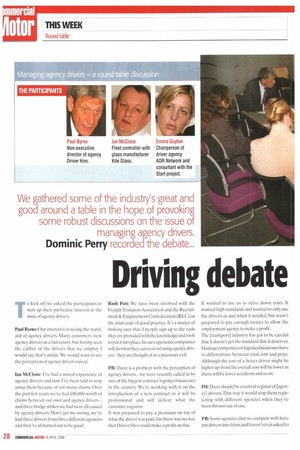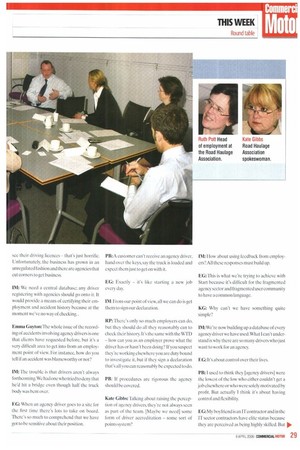Driving debate
Page 28

Page 29

Page 30

If you've noticed an error in this article please click here to report it so we can fix it.
We gathered some of the industry's great and
good around a table in the hope of provoking
some robust discussions on the issue of
managing agency drivers.
Dominic Perry recorded the debate...
T _ o kick off we asked the participants to sum up their particular interest in the issue of agency drivers.
Paul Byrne:Our interest is in seeing the standard of agency drivers. Many customers view agency drivers as a last resort, but having seen the calibre of the drivers that we employ I would say that's unfair. We would want to see the perception of agency drivers raised.
Ian McClone: I've had a mixed experience of agency drivers and now I've been told to stop using them because of too many claims. Over the past few years we've had £80,000-worth of claims between our own and agency drivers — and three bridge strikes we had were all caused by agency drivers. Don't get me wrong, we've had three drivers from three different agencies and they've all turned out to be good. Ruth Pott: We have been involved with the Freight Transport Association and the Recruitment & Employment Confederation (REC) on the joint code of good practice. It's a matter of making sure that if people sign up to the code they are provided with the knowledge and tools to put it into place. In our experience companies will do what they can to avoid using agency drivers— they are thought of as a necessary evil.
PB: There is a problem with the perception of agency drivers.., we were recently called in by one of the biggest contract logistics businesses in the country. We're working with it on the introduction of a new contract so it will be professional and will deliver what the customer requires.
It was prepared to pay a premium on top of what the driver was paid. but there was no way that Driver Hire could make a profit on this. It wanted to use us to drive down costs. It wanted high standards and wanted to only use the drivers as and when it needed, hut wasn't prepared to pay enough money to allow the employment agency to make a profit.
The [transport] industry has got to be careful that it doesn't get the standard that it deserves. Haulage companies or logistics businesses have to differentiate between total cost and price. Although the cost of a better driver might be higher up-front the overall cost will be lower as there will be fewer accidents and so on.
IM:There should be a central register of [agency] drivers, That way it would stop them registering with different agencies when they've been thrown out of one.
PB: Some agencies that we compete with have put drivers into firms and haven't even asked to
see their driving licences — that's just horrific. Unfortunately, the business has grown in an unregulated fashion and there are agencies that cut corners to get business.
IM: We need a central database; any driver registering with agencies should go onto it. It would provide a means of certifying their employment and accident history because at the moment we've no way of checking..
Emma Guyton: The whole issue of the recording of accidents involving agency drivers is one that clients have requested before, but it's a very difficult area to get into from an employment point of view. For instance, how do you tell if an accident was blameworthy or not?
IM: The trouble is that drivers aren't always fortheoming.We had one who tried to deny that he'd hit a bridge even though half the truck body was bent over.
EG: When an agency driver goes to a site for the first time there's lots to take on board. There's so much to comprehend that we have got lobe sensitive about their position. PB: A customer can't receive an agency driver, hand over the keys, say the truck is loaded and expect them just to get on with it.
EG: Exactly — it's like starting a new job every day.
IM: From our point of view, all we can do is get them to sign our declaration.
RP: There's only so much employers can do, but they should do all they reasonably can to check their history. It's the same with the WTD — how can you as an employer prove what the driver has or hasn't been doing? If you suspect they're working elsewhere you are duty bound to investigate it, hut if they sign a declaration that's all you can reasonably be expected to da PB: If procedures are rigorous the agency should be covered.
Kate Gibbs: Talking about raising the perception of agency drivers, they're not always seen as part of the team. [Maybe we need] some form of driver accreditation — some sort of points system? IM: How about using feedback from employers? All these responses must build up.
EG: This is what we're trying to achieve with Start because it's difficult for the fragmented agency sector and fragmented user community to have a common language.
KG: Why can't we have something quite simple?
EN: We're now building up a database of every agency driver we have used.What I can't understand is why there are so many drivers who just want to work for an agency.
EG: It's about control over their lives.
PB: I used to think they [agency drivers] were the lowest of the low who either couldn't get a job elsewhere or who were solely motivated by profit. But actually I think its about having control and flexibility.
EG: My boyfriend is an 1T contractor and in the IT sector contractors have elite status because they are perceived as being highly skilled. But 010 in the transport industry agency drivers have historically been regarded as people who can't get a permanent job.
Emma Guyton talks about the Start initiative. EG: The Start initiative was designed to tackle two things:firstly improving the image and status of the driver agency itself through the use of kite marking; secondly to standardise and create a common system of getting and issuing agency drivers.
For instance, there's no common approach to health and safety training so some drivers are getting none, depending on the firm that they end up working at. Or they get 10-12 assessments, all overlapping that also tend to be very repetitive.There's no common method of transferring training and investment from one company to another.
Start is designed to give quality agencies a way of differentiating from agencies that don't have any of these policies in place. So far it's got quite considerable support. It's all about having a brand within the industry that's actually quite specific to driver agencies.
PB: As an industry leader we feel that we are already setting the standard and in order to be part of a new initiative, well, we'd have to be convinced...
EG: Both Driver Hire and ADR have invested heavily in putting processes in place that show their quality. From a strategic point of view why do we want to bring everybody else up to the same standard?
My personal view is that the problem we have is the image of the industry and therefore any initiative that can raise standards and give the sector a better reputation has to be a good thing.
PB: But who's going to check the agency is a Start agency at 3am when you desperately need a driver?
EG: What we've done is to look at the common things that go on in most sites that use agency drivers and what the drivers need to be taught or assessed on. We've put this together so if a driver goes to company A on Monday then what he or she is trained on is recorded so if they go to another company on Wednesday they don't have to do it again.
PB: Sometimes you need more assurances than that. We've seen occasions where foreign drivers weren't able to understand the 24-hour clock and you would have thought that was obvious.
RP: Numeracy and literacy issues are a problem tooit's much more fundamental than just language. Its a situation where we have more health and safety rules and better safety equipment but we're still getting more accidents. Is it more foreign drivers'? More congestion? An ageing workforce'?
But where does Start fit in with the REC Agency Code of Practice? It's long established I'm not saying it's good, had or indifferent hut what's different?
EG: We're trying to get a common approach and a common code of practice to work to. Nothing in the code is wrong but the problem is that when I've been out to talk to clients they continually confuse the REC with the RAC and aren't even aware of its existence.
RP: I'm not sure all operators will pay attention to that.After all, when you're moving house do you go for the nearest BAR member or phone around for the best price?
EG: What would be great is for the REC code of practice to be strengthened, reviewed and have some form of auditing process to make sure that members are doing those things and for it to be marketed better. It's not about reinventing the wheel; it's about making people aware that the wheel is there. •
































































































































































































